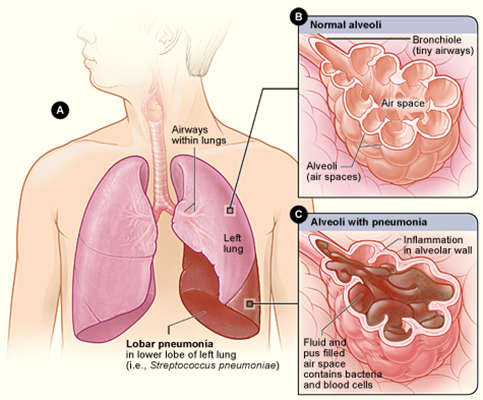Pneumonia
Published .

What is pneumonia?
Pneumonia is an infection in one or both of the lungs. It causes the air sacs of the lungs to fill up with fluid or pus. It can range from mild to severe, depending on the type of germ causing the infection, age, and overall health.
What causes pneumonia?
Bacterial, viral, and fungal infections can cause pneumonia.
Bacteria are the most common cause. Bacterial pneumonia can occur on its own. It can also develop after had certain viral infections such as a cold or the flu. Several different types of bacteria can cause pneumonia, including:
- Streptococcus pneumoniae
- Legionella pneumophila; this pneumonia is often called Legionnaires’ disease
- Mycoplasma pneumoniae
- Chlamydia pneumoniae
- Haemophilus influenzae
Viruses that infect the respiratory tract may cause pneumonia. Viral pneumonia is often mild and goes away on its own within a few weeks. But sometimes it is serious enough that treatment in a hospital. The different viruses that can cause pneumonia include:
- Respiratory syncytial virus (RSV)
- Some common cold and flu viruses
- SARS-CoV-2, the virus that causes COVID-19
Fungal pneumonia is more common in people who have chronic health problems or weakened immune systems. Some of the types include:
- Pneumocystis pneumonia (PCP)
- Coccidioidomycosis, which causes valley fever
- Histoplasmosis
- Cryptococcus
Who is at risk for pneumonia?
Anyone can get pneumonia, but certain factors can increase the risk:
- Age; the risk is higher for children who are age 2 and under and adults age 65 and older
- Exposure to certain chemicals, pollutants, or toxic fumes
- Lifestyle habits, such as smoking, heavy alcohol use, and malnourishment
- Being in a hospital, especially the ICU. Being sedated and/or on a ventilator raises the risk even more.
- Having a lung disease
- Having a weakened immune system
- Have trouble coughing or swallowing, from a stroke or other condition
- Recently being sick with a cold or the flu
What are the symptoms of pneumonia?
The symptoms of pneumonia can range from mild to severe and include:
- Fever
- Chills
- Cough, usually with phlegm
- Shortness of breath
- Chest pain while breathing or coughing
- Nausea and/or vomiting
- Diarrhea
The symptoms can vary for different groups. Newborns and infants may not show any signs of the infection. Others may vomit and have a fever and cough. They might seem sick, with no energy, or be restless.
Older adults and people who have serious illnesses or weak immune systems may have fewer and milder symptoms. They may even have a lower than normal temperature. Older adults who have pneumonia sometimes have sudden changes in mental awareness.
What other problems can pneumonia cause?
Sometimes pneumonia can cause serious complications such as:
- Bacteremia, which happens when the bacteria move into the bloodstream. It is serious and can lead to septic shock.
- Lung abscesses, which are collections of pus in cavities of the lungs
- Pleural disorders, which are conditions that affect the pleura. The pleura is the tissue that covers the outside of the lungs and lines the inside of the chest cavity.
- Kidney failure
- Respiratory failure
How is pneumonia diagnosed?
Sometimes pneumonia can be hard to diagnose. This is because it can cause some of the same symptoms as a cold or the flu. Diagnosis is often based on the following:
- A medical history
- A physical exam including auscultation of lung sounds
- Various tests, such as
- A chest x-ray
- Blood tests such as a complete blood count (CBC) to see if the immune system is actively fighting an infection
- A Blood culture to find out if a bacterial infection has spread to the bloodstream
- Sputum test, which checks for bacteria in a sample of sputum (spit) or phlegm
- Chest CT scan to see how much of the lungs has been affected. It may also show complications such as lung abscesses or pleural effusions.
- Pleural fluid culture, which checks for bacteria in a fluid sample that was taken from the pleural space
- Pulse oximetry or blood oxygen level test, to check how much oxygen is in the blood
- Bronchoscopy, a procedure used to look inside the lungs’ airways
What are the treatments for pneumonia?
Treatment for pneumonia depends on the type of pneumonia, which germ is causing it, and how severe it is:
- Antibiotics treat bacterial pneumonia and some types of fungal pneumonia. They do not work for viral pneumonia.
- In some cases, the physician may prescribe antiviral medicines for viral pneumonia
- Antifungal medicines treat other types of fungal pneumonia
